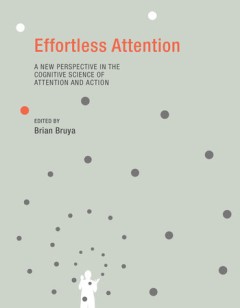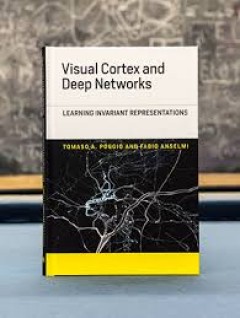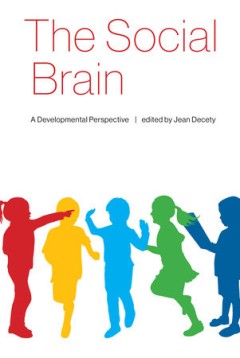Filter by

Effortless Attention: A New Perspective in the Cognitive Science of Attention…
The phenomena of effortless attention, action & the challenges they pose to current cognitive models of attention & action are discussed in this volume.OCLC-licensed vendor bibliographic record.
- Edition
- -
- ISBN/ISSN
- 9780262269438
- Collation
- 1 online resource (viii, 449 pages) :illustrations.
- Series Title
- -
- Call Number
- -

Perception beyond Inference: The Information Content of Visual Processes
Proposing a new paradigm for perceptual science that goes beyond standard information theory and digital computation. This book breaks with the conventional model of perception that views vision as a mere inference to an objective reality on the basis of "inverse optics." The authors offer the alternative view that perception is an expressive and awareness-generating process. Perception creates…
- Edition
- -
- ISBN/ISSN
- 9780262295550
- Collation
- 1 online resource (ix, 445 pages) :illustrations
- Series Title
- -
- Call Number
- -

A brain for numbers :the biology of the number instinct
OCLC-licensed vendor bibliographic record.
- Edition
- -
- ISBN/ISSN
- 9780262354318
- Collation
- 1 online resource (344 pages).
- Series Title
- -
- Call Number
- -

The Cognitive Neuroscience of Mind: A Tribute to Michael S. Gazzaniga
These essays on a range of topics in the cognitive neurosciences report on the progress in the field over the twenty years of its existence and reflect the many groundbreaking scientific contributions and enduring influence of Michael Gazzaniga, 'the godfather of cognitive neuroscience'.OCLC-licensed vendor bibliographic record.
- Edition
- -
- ISBN/ISSN
- 9780262266055
- Collation
- 1 online resource (ix, 240 pages, 4 unnumbered pages of plates) :illustrations (some color)
- Series Title
- -
- Call Number
- -

Handbook of functional neuroimaging of cognition
A new edition of the essential resource on using functional neuroimaging techniques to study the neural basis of cognition, revised with the student in mind; thoroughly updated, with new chapters on fMRI physics, skill learning, emotion and social cognition, and other topics. This essential resource on neuroimaging provides an accessible and user-friendly introduction to the field written by le…
- Edition
- 2nd ed.
- ISBN/ISSN
- 9780262316323
- Collation
- 1 online resource (x, 492 pages, 20 unnumbered pages of plates) : illustrations (some color).
- Series Title
- Cognitive Neuroscience
- Call Number
- 610 HAN

Visual Cortex and Deep Networks: Learning Invariant Representations
A mathematical framework that describes learning of invariant representations in the ventral stream, offering both theoretical development and applications.The ventral visual stream is believed to underlie object recognition in primates. Over the past fifty years, researchers have developed a series of quantitative models that are increasingly faithful to the biological architecture. Recently, …
- Edition
- -
- ISBN/ISSN
- 9780262336710
- Collation
- 1 online resource (xiv, 118 pages) :illustrations.
- Series Title
- -
- Call Number
- -

Consciousness :confessions of a romantic reductionist
"What links conscious experience of pain, joy, color, and smell to bioelectrical activity in the brain? How can anything physical give rise to nonphysical, subjective, conscious states? Christof Koch has devoted much of his career to bridging the seemingly unbridgeable gap between the physics of the brain and phenomenal experience. This engaging book--part scientific overview, part memoir, part…
- Edition
- -
- ISBN/ISSN
- 9780262301787
- Collation
- 1 online resource (xii, 181 pages)
- Series Title
- -
- Call Number
- -

Zen-Brain Horizons: Toward a Living Zen
A neurologist and Zen practitioner clarifies the benefits of meditative training, drawing on classical Buddhist literature and modern brain research."In Zen-Brain Horizons, James Austin draws on his decades of experience as a neurologist and Zen practitioner to clarify the benefits of meditative training. Austin integrates classical Buddhist literature with modern brain research, exploring the …
- Edition
- -
- ISBN/ISSN
- 9780262321150
- Collation
- 1 online resource (xxi, 273 pages) :color illustrations
- Series Title
- -
- Call Number
- -

Explaining the computational mind
In this work, Marcin Milkowski argues that the mind can be explained computationally because it is itself computational - whether it engages in mental arithmetic, parses natural language, or processes the auditory signals that allow us to experience music.OCLC-licensed vendor bibliographic record.
- Edition
- -
- ISBN/ISSN
- 9780262313919
- Collation
- 1 online resource (x, 243 pages)
- Series Title
- -
- Call Number
- -

The social brain :a developmental perspective
"This new volume brings together a range of empirical and theoretical views from both developmental psychology and developmental neuroscience, and cover a core set of questions and topics that concern the development of the social mind. The basic topics about the origins, development, and biological bases of the human social mind include, but are not limited to, face and voice recognition, atta…
- Edition
- -
- ISBN/ISSN
- 0262358964
- Collation
- 1 online resource (xii, 426 pages) :illustrations (black and white).
- Series Title
- -
- Call Number
- -
 Computer Science, Information & General Works
Computer Science, Information & General Works  Philosophy & Psychology
Philosophy & Psychology  Religion
Religion  Social Sciences
Social Sciences  Language
Language  Pure Science
Pure Science  Applied Sciences
Applied Sciences  Art & Recreation
Art & Recreation  Literature
Literature  History & Geography
History & Geography